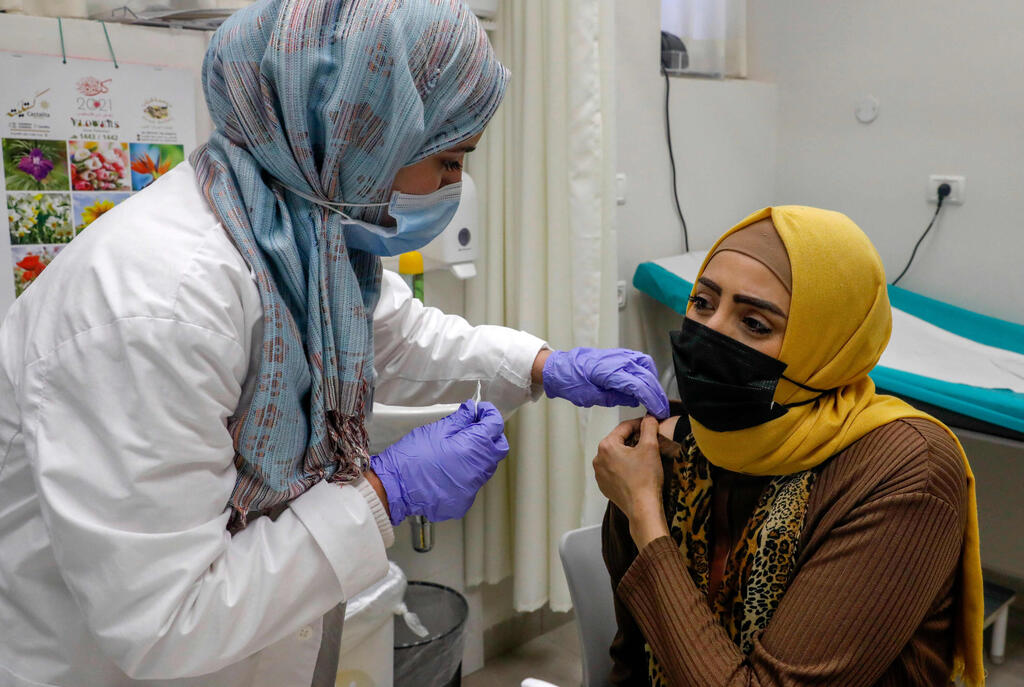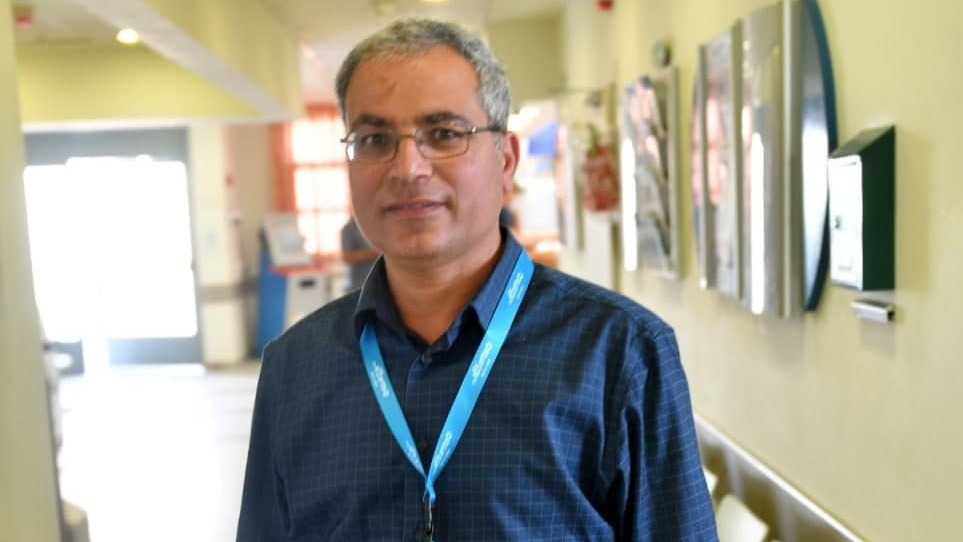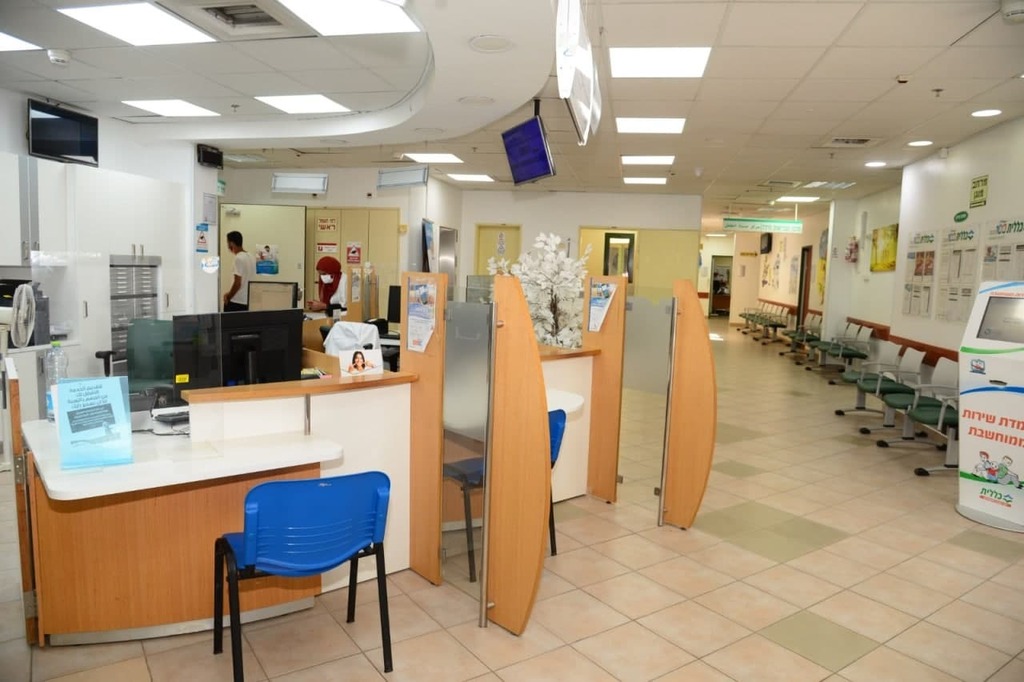Getting your Trinity Audio player ready...
It is 12:30 p.m and the central clinic of the Clalit health fund in the Bedouin town of Lakiya is almost empty. No coronavirus tests are being conducted and even the vaccination stations are almost completely empty.
Dr. Fuad al-Sana, the head of the Clalit in the southern Negev, stops by to check in. He is disappointed at the sight of the deserted facility, but not surprised. From the beginning of the pandemic he has been trying to persuade members of the Bedouin communities in the south to get vaccinated.
Now, with the advent of a new wave of the virus, he again finds himself fighting the misinformation about the vaccines and the virus itself and has recruited community leaders and dignitaries in his battle.
"There are people who believe less in the vaccine and coronavirus in general," he says. "There are rumors and stories circulating in the media and it all has an impact."
The coming school year, he hopes, will bring about a change.
"If going to school means either vaccination or a daily test, it will encourage people to get vaccinated," the doctor says.
"The problem is that the current percentage of young people who have been vaccinated is very low, so low that no one can guarantee that the school year will even begin on schedule. There is also a fear of lockdown due to widespread exposure. We have to get people to get vaccinated or they can sit at home without endangering those who are."
On his way out of the clinic, al-Sana encounters 25-year-old Hassan Alfagir, who has not yet been vaccinated and is sitting in the waiting room without a mask.
Receptionist Roai Abu Gouma quickly hands him a mask.
"I will not get vaccinated," Alfagir says. "The vaccine does not scare me, but I work and don’t have the time."
Abu Gouma is quick to respond: "You don’t have the time? You can get it now!"
"You ambushed me," Alfagir replies. "Getting vaccinated doesn't help anyone at all."
But he agrees to get jabbed and asks for an appointment for the following day. But it is unlikely that he will turn up.
The problem of getting vaccines into arms also exists among those who have already had their first two shots. Only 9.5% of Clalit patients over the age of 60 in Lakiya have received the third booster vaccine, compared to a little over 48% of the overall population for that age range.
In Tel Sheva, a Bedouin town on the outskirts of Be'er Sheva, it is just 8% and in areas such Umm Batin and Bir Hadaj and among the members of the Al-Atrash tribe, it is even lower.
Umm Batin and Bir Hadaj and among the members of the Al-Atrash tribe, it is even lower.
"The population in Tel Sheva has a very low socioeconomic status. From a tribal point of view, the community is very complex and there is a challenge to provide medical services," says al-Sana, as he enters the local clinic there.
Omar Abu Rakeik, the head of the regional council, is a certified nurse.
"He was one of the first to post a call to get vaccinated on Facebook and WhatsApp," says al-Sana. "Without his personal involvement and tenacity we would have be looking at a community with the highest infection and lowest vaccination rates."
Nurse Sari Algalaban, a resident of Aroer, is in charge of the vaccines.
"In the Bedouin sector, as in the entire Arab sector, 'fake news' has hit the vaccination rate hard and has continued to do so with the third vaccine," he says.
He says they are trying to calm people's nerves with personal phone calls, including from doctors, and the vaccination centers are also open on Saturdays.
The percentage of vaccinated people in the general Arab population is higher at 53%, but still far from the 69% of the Jewish population who have been jabbed.
Prof. Bishara Bisharat, chair of the Israel Medical Association’s Society for Health Promotion in the Arab Community and a senior member of the Health Ministry coronavirus taskforce for the Arab sector, says that the Arab population can be divided into three parts, each with its own unique challenges.
"In East Jerusalem, there is a lack of trust in all state systems, so it is difficult to get people vaccinated," he says.
"There was a stage at which Jews began to go to East Jerusalem to get vaccinated due to high demand elsewhere, and ironically this is what led the Arab community to turn out as well," Bisharat says.
3 View gallery


A Palestinian resident of East Jerusalem is vaccinated against coronavirus
(Photo: AFP)
"In the Negev, people have low socioeconomic status, and this is a sector that is more difficult to get vaccinated. Throughout the sector there is a lack of health literacy and an adherence to misinformation. It is easy for people to get caught up in fake news because they only read headlines. For most people it is impossible to understand a subject in depth when one does not understand the language."
There is a similar story in the north, even in large cities like Umm al-Fahm. People are on the street without masks and the clinics are empty of those coming to get vaccines.
"Many young people here still do not believe there is a coronavirus pandemic at all," says Dr. Khaled Mahmoud, a local dentist. The authorities "have to wake up," he says. "They have to launch a broad explanation campaign and follow up."
A group of young people are walking around the city without masks, none of whom say they have been vaccinated.
"All the sick people have come through Ben-Gurion Airport anyway," one says.
"The coronavirus is not really worrying anyway, aside from a few days of quarantine. We are more concerned about the side effects of the vaccine. There are many differences between what is happening here and what is happening in the Jewish sector. Why is it so important to you that we get vaccinated anyway? Invest in information, invest in us. "



